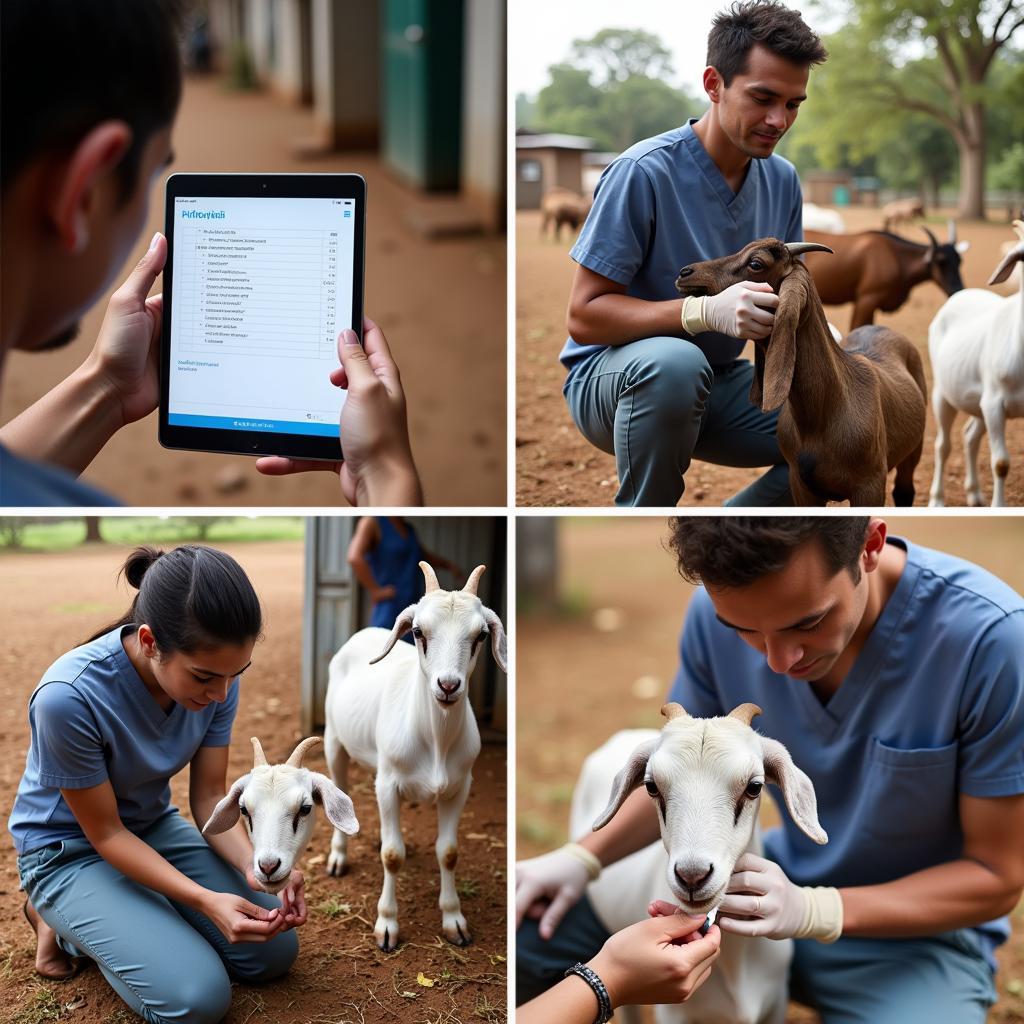Exploring the Potential of an African Goat Farm
African Goat Farming presents a unique opportunity for sustainable agriculture and economic development. From the hardy Boer goat to indigenous breeds, these animals thrive in diverse climates and offer multiple avenues for profit. This article delves into the world of African goat farms, exploring their benefits, challenges, and the various aspects to consider when starting one.
One of the key advantages of focusing on goats lies in their adaptability. african goat farming in bengal provides an example of how these animals can be successfully raised even in regions outside of their native habitat. The low startup costs compared to other livestock ventures also make it an appealing option for smaller farmers. This includes lower feed costs, as goats are known for their browsing habits and can utilize a wider range of vegetation compared to other livestock.
Why Choose an African Goat Farm?
What makes African goat breeds particularly appealing? Several factors contribute to their growing popularity. Their resilience to disease, ability to adapt to harsh climates, and high fertility rates make them ideal for various farming systems. Moreover, the increasing demand for goat meat and milk, both locally and internationally, offers promising market opportunities. From a nutritional standpoint, goat milk is often easier to digest than cow’s milk and is a rich source of essential vitamins and minerals.
Getting Started with Your African Goat Farm
Establishing a successful African goat farm requires careful planning and execution. Choosing the right breed, ensuring adequate housing and nutrition, and implementing effective health management strategies are crucial for maximizing productivity and profitability.
Selecting the Right Breed for Your African Goat Farm
Different goat breeds offer unique characteristics and are suited to different farming objectives. The Boer goat, known for its meat production, is a popular choice. Other breeds, like the Saanen and Toggenburg, are highly valued for their milk production. Researching and selecting breeds that align with your goals, local climate, and available resources is paramount.
Essential Housing and Nutritional Needs
Providing adequate shelter and nutrition is essential for the health and well-being of your goats. Well-ventilated housing that protects from extreme weather conditions and predators is crucial. A balanced diet, rich in essential nutrients, ensures optimal growth, reproduction, and overall productivity.
african goat farming in india has seen a significant rise, particularly due to the adaptability of these breeds to the Indian climate and their increasing demand in the market. This trend reflects the growing global interest in sustainable and profitable goat farming.
Managing a Thriving African Goat Farm
Ongoing management is vital to ensure the long-term success of your goat farm. Regular health checks, vaccinations, and parasite control measures are essential. Breeding strategies, record-keeping, and market analysis also contribute to maximizing profitability.
Health Management and Disease Prevention
Implementing a proactive health management plan is crucial for minimizing disease risks and maintaining a healthy herd. Regular veterinary check-ups, vaccinations against common goat diseases, and effective parasite control measures contribute significantly to the overall well-being and productivity of your goats.
african goat farm in maharashtra demonstrates the feasibility and profitability of raising African goats in diverse regions of India. This further highlights the adaptability and potential of these breeds in contributing to local economies.
Breeding Strategies and Record-Keeping
Implementing effective breeding strategies and maintaining detailed records are essential aspects of successful goat farming. Selective breeding can help improve the genetic quality of your herd, leading to increased productivity and profitability. Accurate record-keeping enables you to track breeding cycles, monitor animal health, and manage farm operations efficiently.
 Modern Management Techniques on an African Goat Farm
Modern Management Techniques on an African Goat Farm
Conclusion
African goat farming offers a promising pathway for sustainable agriculture and economic empowerment. By carefully considering the factors discussed in this article, aspiring goat farmers can establish and manage thriving operations. [african goat farm] has the potential to not only provide a sustainable livelihood but also contribute to food security and economic development in various regions.
“African goats are hardy and adaptable animals,” says Dr. Akinwumi Adesina, an agricultural economist. “Their resilience to harsh climates and diseases makes them an excellent choice for farmers in diverse environments.”
Another expert, Dr. Khadija Bowler, a veterinarian specializing in small ruminants, adds, “Investing in good quality breeding stock and implementing a robust health management plan is crucial for the success of any goat farm.”
“Proper nutrition and housing are essential for maximizing the productivity of your goats,” emphasizes Mr. Bismark Ampah, an experienced goat farmer. “Providing a balanced diet and ensuring access to clean water and shelter are crucial for their overall well-being.”
african boer goat farm faltan and african boer goat farm in nashik offer further insights into specific Boer goat farming operations. Exploring different models and approaches can provide valuable lessons for those looking to establish their own African goat farms.
FAQ
- What are the most common African goat breeds?
- What are the initial setup costs for an African goat farm?
- How much space do goats need?
- What is the average lifespan of an African goat?
- What kind of feed do African goats need?
- What are the common diseases affecting African goats?
- How can I market my goat products?
Need more information? Explore related topics on our website, including goat breeds, farm management, and disease prevention.
Contact us for any assistance. Call: +255768904061, Email: [email protected] or Visit: Mbarali DC Mawindi, Kangaga, Tanzania. We have a 24/7 customer support team.
